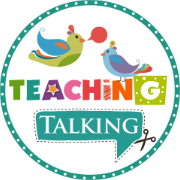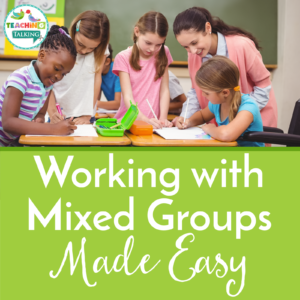
Speech Therapy Groups: Maintaining the Quality of Therapy
June 15, 2016 6 min read
Sometimes our “small” groups are not only mixed, they’re also sometimes “not so small.”
In a previous post, Speech Therapy Mixed Groups Made Easy for SLPs, the challenges of working with mixed groups were addressed. In this post we have suggestions for maintaining the efficiency and integrity of your sessions despite the “not so small” speech therapy groups.
Large Speech Therapy Groups Don’t Have to Make You Nervous!
Planning is critical. Even if you have to modify your plan, it’s critical that you have a plan, and sometimes a backup, because at some point or another, the most wonderful therapy plan will flop for one reason or another. This is especially true when your primary therapy plan requires the use of technology.

Another “must have” in large speech therapy groups is behavior management. Establish clear guidelines and expectations. Have these expectations posted in your room. If you’re mobile like many of us are, then consider having a portable copy of the rules to which you can direct the attention of your students without having to provide verbal redirection.

Books and their companions
Books are one of my favorite therapy resources because they are ideal for addressing so many goals facing speech therapy groups. A good way to address multiple goals in small or large groups is to use books and book companions.
You can find book companions that are already made, or you can make your own. If you don’t want to make companions for every book and your budget is limited, try a generic book companion that can be used with almost any book.
Reading different versions of the same book is great for compare and contrast and can get you through nearly a whole month of therapy.
Sometimes I like to use exit tickets (click the link to view) – those are pretty generic and can be customized; however, there are several options for themed exit tickets available on TpT as well.
Door/Board Tasks
On the front/back of your door or a designated board, create a task for the week for a variety of skills. (Ex. Idiom of the week, Word of the week, Synonym/Antonym Task, etc.)
The key is to identify your most common goals, make sure your students know their goals, and teach your students to come in and get the task designated to address individual needs without having to provide detailed instructions every session.
The photo below shows how Christina, The Modern SLP, monitors her students goals and progress visually.

You can use colored file folders that are sealed on the sides to hold the task cards or worksheets. This works best with older students; however, you can use it with younger students as well. For the students who are young and unable to read independently, consider using shapes or animals on the folders holding worksheets so that non-readers can easily identify their tasks. It’s best to consistently use the same folders/shapes for the same skills each time.
Once everyone is seated in place, explain the directions for the activity that most of the students have to complete. Get them going, and then on to the next group. (I like to use page protectors and dry-erase markers to save paper and to easily correct mistakes.
Games
Some SLPs shy away from the use of games because so many people think all we do is “play” in the therapy room. As professionals, we know that playing can and will enhance development and learning when facilitated properly. Playing games is definitely helpful when working with mixed and large groups.
You can use commercial games “as is” or you can alter them to enhance the learning experience. Either way, an old-fashioned game board paired with articulation and/or language cards is a great way to address multiple goals.

If you’re into technology and are lucky enough to have a smart board, the options are endless. There are “no-print” products on TpT and online interactive games on the internet. Technology can be tricky, but it comes in quite handy for large groups. Jeopardy style games are great because your categories can be determined based on the goals in your group. There are numerous templates to make technology-based Jeopardy games available on TpT.
I prefer playing Jeopardy using a Heavy Duty Pocket Chart (for sentence strips) and index cards so that I can revise or add content as needed without using a lot of time. The “homemade” Jeopardy game is also preferred because I don’t have to worry about glitches with technology.
Not only does it work well in large groups, but this Jeopardy system also works well with all ages because you can picture cards with early elementary and non-readers. The key is to keep those cards bound together so that your categories don’t become mixed like your groups.
Interactive Notebooks
I won’t go into a lot of detail about this now because interactive notebooks will be covered more in-depth in a later post; however, utilizing interactive notebooks in speech therapy groups is a great way to address multiple goals in large groups.
Buy those spiral and composition notebooks when they’re on sale during the summer, and they’ll become some of your greatest materials once you make them interactive. You can separate the notebooks into sections based on goals. For example, if you have a student with articulation, vocabulary, and social skills goals, you can use tabs to designate a section of the notebook for each skill.

- Articulation Notebooks for Speech Therapy
- Language Notebooks for Speech Therapy
- Apraxia Notebooks for Speech Therapy
- FREE Editable Divider Tabs for Speech Therapy Notebooks
Centers
If you’re lucky enough not to be in a closet, centers are great for mixed groups, especially if you have student computers. You can create a technology center for “no-print” and/or interactive online activities. I like “no-print” activities better than online activities because the students can’t venture to other places like they can on the internet. If you have iPads, I’m sure there’s an app for many of the skills you need to target. You can create an independent center using the Door/Board Tasks idea from above, and last, but not least, YOU can be a center. Please note that the best practice is for each student to spend direct time with you every session.
YouTube
I always have a backup plan for this because I never know when the technology is going to take an unscheduled break, but YouTube is a great resource for therapy in large groups. The kids love the idea of using technology, so YouTube is always a winner.

Disclaimer: Not all content is child-friendly or appropriate for school, so you should ALWAYS, ALWAYS, ALWAYS preview before using in sessions.
I actually preview at home because I don’t want to accidentally violate the rules for appropriate use.
Now that we’ve covered that, here are some of the ways to use YouTube: introduce and supplement nonfiction stories; introduce and/or review social skills, rules, and scenarios; read books, find songs that give auditory directions for completing dance moves; etc. The options are endless. Be warned, you can lose just as many hours on YouTube as you do on Pinterest and TpT if you’re not careful.
Kahoot
If you have upper elementary, middle, and high school students with their own technology, Kahoot is a great resource for large speech therapy groups. You create your own games, so you can address as many different skills as you’d like in a single game. In addition to the flexibility of the resource, it really keeps the students engaged. Please note this only works if you have multiple computers, tablets, and/or smartphones. Kahoot is completely free and can be accessed here.
Always Collect Therapy Data
Last but not least, make sure you collect therapy data. Your therapy should always be data-driven. You may have to think outside the box, but data collection can and should occur even in “not so small” or large speech therapy groups. Personally, I keep a data binder with my students’ data sheets organized by group, but for some people, this is too bulky or overwhelming.
Kathryn from Teaching Talking has a wonderful blog post about Collecting Data with Less Stress. In most of her products, data sheets are built right into the activity!

Here are a few more suggestions for data collection in large groups:
- Use group data collection forms.
- If your students are older, teach them to collect data.
- Use therapy activities (worksheets, apps, exit tickets, etc.) that you can review at a later time to assess performance accuracy.
- Use address labels or sticky notes during sessions, and then apply the correct label or sticky note to each student’s individual data sheet.
- Use a data collection app or excel program.
Remember, you’re an SLP synonymous with superhero. You CAN provide quality therapy in groups regardless of the dynamics in size or goals!

Bio:
Truvine Walker obtained her undergraduate and graduate degrees in Speech-Language Pathology on the beautiful campus of Valdosta State University in Valdosta, GA. After 3 years of working in the public schools in northern Virginia, Truvine decided to broaden her horizons and explore the world of travel therapy. As a traveling SLP, Truvine has worked in schools, hospitals, skilled nursing facilities, outpatient clinics, and inpatient rehabilitation facilities in a total of 8 different states. Truvine is finishing up her 17th year as an SLP, and is just as excited about the profession as she was in the very first year. In addition to loving learning about all things speech and language, Truvine loves bowling, reading, sightseeing, spending time with family, and of course, traveling.
Subscribe
Sign up to get the latest on sales, new releases and more …


